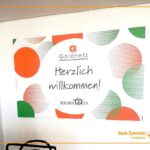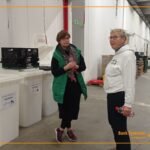Travel educates, or how the TriCity Food Bank visited Berliner Tafel…
Berlin – Alexander Platz, curry wurst, Parthenon, Berlin Wall and Zoo Station – a city of museums, monuments, the seat of the German government… what do you associate Berlin with? From now on, we will associate the city with Berliner Tafel – the Berlin Food Bank, which we visited at the end of October. How did this happen? We sat down, thought, wondered how we could learn and came up with the idea that maybe we would watch how Food Banks work in Poland and neighboring countries. We financed the visit as part of a grant financed by the Norwegian Funds under the Active Citizens – Regional Fund Program.
We visited the headquarters of Berliner Tafel, their charity shop and the food distribution point.
Berliner Tafel it is, above all, impressive numbers – 5 fundraisers, 19 employees, 30 cars, 2,000 volunteers and over 200,000 people who receive help. It’s impressive, isn’t it? Berliner Tafel is an institution – if there is excess food in a restaurant, grocery store or food market that could have been vasted, the first idea that comes to the management’s mind is to donate the excess food to Berliner Tafel. It would have been great if the same happened to the TriCity Food Bank. But we know it will happen some day.
The person who founded Berliner Tafel, and who is now an extremely active member of the organization and even a woman-institution, is Sabine Werth. She started by carrying bread from a nearby restaurant in nets, and today she helps 200,000 people.
Berliner Tafel is also a very well-organized “enterprise” – the movement of cars distributing food is supervised by a computer system. The system was created by a start-up and Berliner Tafel offered to try it out as part of a test run within their organization. Today, the system is implemented in companies and still allows to supervise car movements in Berliner Tafel. Due to the large amount of food distributed in the warehouse and between the warehouse and the distribution points, there are many plastic containers; Berliner Tafel uses a system of arranging containers according to size, so that you do not have to look for a container that will fit a specific amount of food. Specialized washing machines were purchased to wash the containers. They are operated by specially trained employees.
Interestingly, Berliner Tafel is financed only thanks to private donations; the organization does not receive funding from the state, region or city. This approach, of course, requires a lot of effort from fundraisers and Sabine herself, who tries to promote the idea of Berliner Tafel as widely as possible.

Berliner Tafel, in addition to supporting non-governmental organizations, also issues food packages. You can receive a parcel once a week, only in the district where you live and you must prove that you are a person with a low income or in a difficult life situation. We accompanied volunteers during the packages distribution. People in need register in a notebook and mark the dates on which they collected food. Upon release, each person in need receives a card with information on what day and time they should appear again to receive food parcel. Food distribution is handled by volunteers; the prepared packages contain vegetables, fruit, semi-finished products, some sweet additives and dairy products. The parcels are prepared at the Berliner Tafel warehouse on the same day, mainly from food close to expiry date.
The time spent at Berliner Tafel was extremely intense and informative. And we saw what we can aspire to. I they succeeded, why not us?
The organization’s activities in 2022-24 are co-financed by the Norwegian Funds under the Active Citizens Program – Regional Fund.
#activecitizensregionalfund #education #institutionalgrant #BerlinerTafel #welearn
